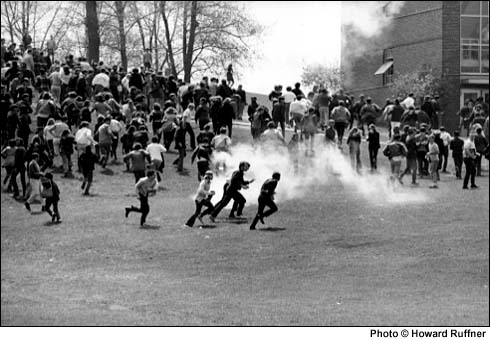Kent State: May 4, 1970
An excerpt from my dissertation:
President Nixon revealed the US invasion of Cambodia on April 30, 1970, in a televised speech. At a news conference the next day National Student Association president Charles Palmer, flanked by ten collegiate student body presidents, denounced the invasion and Nixon’s “odious disregard of the constitution” and called for his impeachment.
The nation’s first student strikes in response to the invasion had already been called by the time Palmer spoke, and by Monday walkouts had begun, with NSA’s enthusiastic support, at dozens of campuses. Throughout the weekend NSA staff worked with an impromptu national strike center at Brandeis University to coordinate, encourage, and publicize strike activity as best they could.
Many campuses closed as the protests escalated, but Kent State in Ohio stayed open, and that state’s governor — facing a deteriorating situation on campus in the final stages of a tight re-election race — called out the National Guard. On Monday, a little after noon, Guard troops on the campus fired on a crowd of protesters. The gunfire killed four people, including two students who were walking past the protest on their way to class.
It’s Time for the New York Times to Stop Calling Rape “Sex.”
President Nixon revealed the US invasion of Cambodia on April 30, 1970, in a televised speech. At a news conference the next day National Student Association president Charles Palmer, flanked by ten collegiate student body presidents, denounced the invasion and Nixon’s “odious disregard of the constitution” and called for his impeachment.
The nation’s first student strikes in response to the invasion had already been called by the time Palmer spoke, and by Monday walkouts had begun, with NSA’s enthusiastic support, at dozens of campuses. Throughout the weekend NSA staff worked with an impromptu national strike center at Brandeis University to coordinate, encourage, and publicize strike activity as best they could.
Many campuses closed as the protests escalated, but Kent State in Ohio stayed open, and that state’s governor — facing a deteriorating situation on campus in the final stages of a tight re-election race — called out the National Guard. On Monday, a little after noon, Guard troops on the campus fired on a crowd of protesters. The gunfire killed four people, including two students who were walking past the protest on their way to class.
It’s Time for the New York Times to Stop Calling Rape “Sex.”
Yesterday the New York Times reported on the arrest of four college athletes accused of raping two women. In the body of their story, the Times described the allegations plainly, saying that the four stood “accused of raping two female students from nearby Spelman College in Atlanta.”
In the article’s headline, however, in print and online, the paper said the students had been arrested on “Sex Charges.” Not rape charges, sex charges.
Over the course of the afternoon feminists questioned the Times’ choice of headline on social media, with several — including myself — addressing complaints directly to the paper’s Public Editor and Standards Editor. Neither has responded directly so far, but not long after the paper’s critics hit Twitter the online version of the headlinewas amended — it now says the students “Face Sexual Assault Charges.”
As it turns out, the Times is unusual in that its in-house style manual specifically warns against the use of
In the article’s headline, however, in print and online, the paper said the students had been arrested on “Sex Charges.” Not rape charges, sex charges.
Over the course of the afternoon feminists questioned the Times’ choice of headline on social media, with several — including myself — addressing complaints directly to the paper’s Public Editor and Standards Editor. Neither has responded directly so far, but not long after the paper’s critics hit Twitter the online version of the headlinewas amended — it now says the students “Face Sexual Assault Charges.”
As it turns out, the Times is unusual in that its in-house style manual specifically warns against the use of

